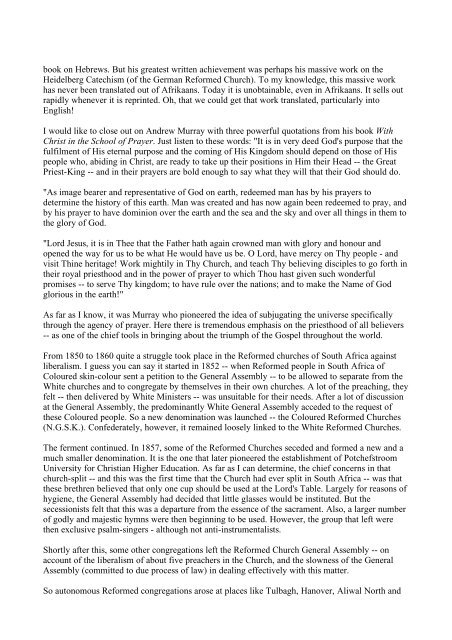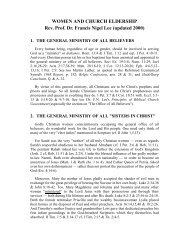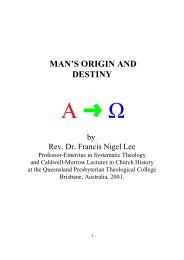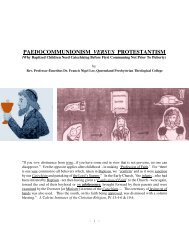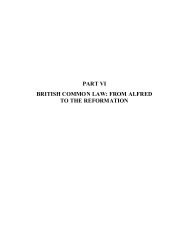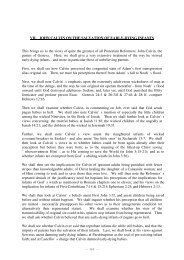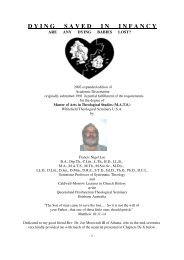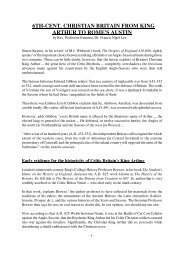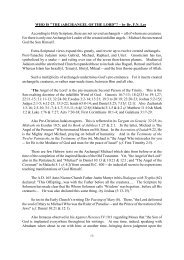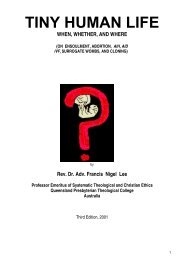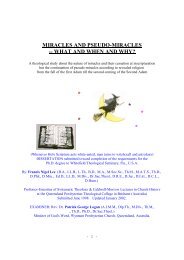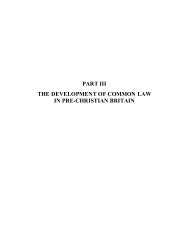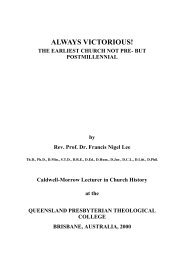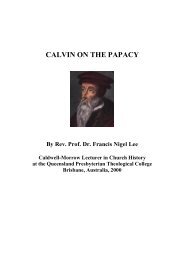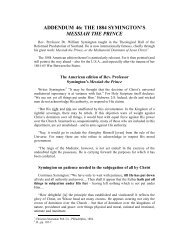THE CHRISTIAN AFRIKANERS - The Works of F. N. Lee
THE CHRISTIAN AFRIKANERS - The Works of F. N. Lee
THE CHRISTIAN AFRIKANERS - The Works of F. N. Lee
Create successful ePaper yourself
Turn your PDF publications into a flip-book with our unique Google optimized e-Paper software.
ook on Hebrews. But his greatest written achievement was perhaps his massive work on theHeidelberg Catechism (<strong>of</strong> the German Reformed Church). To my knowledge, this massive workhas never been translated out <strong>of</strong> Afrikaans. Today it is unobtainable, even in Afrikaans. It sells outrapidly whenever it is reprinted. Oh, that we could get that work translated, particularly intoEnglish!I would like to close out on Andrew Murray with three powerful quotations from his book WithChrist in the School <strong>of</strong> Prayer. Just listen to these words: "It is in very deed God's purpose that thefulfilment <strong>of</strong> His eternal purpose and the coming <strong>of</strong> His Kingdom should depend on those <strong>of</strong> Hispeople who, abiding in Christ, are ready to take up their positions in Him their Head -- the GreatPriest-King -- and in their prayers are bold enough to say what they will that their God should do."As image bearer and representative <strong>of</strong> God on earth, redeemed man has by his prayers todetermine the history <strong>of</strong> this earth. Man was created and has now again been redeemed to pray, andby his prayer to have dominion over the earth and the sea and the sky and over all things in them tothe glory <strong>of</strong> God."Lord Jesus, it is in <strong>The</strong>e that the Father hath again crowned man with glory and honour andopened the way for us to be what He would have us be. O Lord, have mercy on Thy people - andvisit Thine heritage! Work mightily in Thy Church, and teach Thy believing disciples to go forth intheir royal priesthood and in the power <strong>of</strong> prayer to which Thou hast given such wonderfulpromises -- to serve Thy kingdom; to have rule over the nations; and to make the Name <strong>of</strong> Godglorious in the earth!"As far as I know, it was Murray who pioneered the idea <strong>of</strong> subjugating the universe specificallythrough the agency <strong>of</strong> prayer. Here there is tremendous emphasis on the priesthood <strong>of</strong> all believers-- as one <strong>of</strong> the chief tools in bringing about the triumph <strong>of</strong> the Gospel throughout the world.From 1850 to 1860 quite a struggle took place in the Reformed churches <strong>of</strong> South Africa againstliberalism. I guess you can say it started in 1852 -- when Reformed people in South Africa <strong>of</strong>Coloured skin-colour sent a petition to the General Assembly -- to be allowed to separate from theWhite churches and to congregate by themselves in their own churches. A lot <strong>of</strong> the preaching, theyfelt -- then delivered by White Ministers -- was unsuitable for their needs. After a lot <strong>of</strong> discussionat the General Assembly, the predominantly White General Assembly acceded to the request <strong>of</strong>these Coloured people. So a new denomination was launched -- the Coloured Reformed Churches(N.G.S.K.). Confederately, however, it remained loosely linked to the White Reformed Churches.<strong>The</strong> ferment continued. In 1857, some <strong>of</strong> the Reformed Churches seceded and formed a new and amuch smaller denomination. It is the one that later pioneered the establishment <strong>of</strong> PotchefstroomUniversity for Christian Higher Education. As far as I can determine, the chief concerns in thatchurch-split -- and this was the first time that the Church had ever split in South Africa -- was thatthese brethren believed that only one cup should be used at the Lord's Table. Largely for reasons <strong>of</strong>hygiene, the General Assembly had decided that little glasses would be instituted. But thesecessionists felt that this was a departure from the essence <strong>of</strong> the sacrament. Also, a larger number<strong>of</strong> godly and majestic hymns were then beginning to be used. However, the group that left werethen exclusive psalm-singers - although not anti-instrumentalists.Shortly after this, some other congregations left the Reformed Church General Assembly -- onaccount <strong>of</strong> the liberalism <strong>of</strong> about five preachers in the Church, and the slowness <strong>of</strong> the GeneralAssembly (committed to due process <strong>of</strong> law) in dealing effectively with this matter.So autonomous Reformed congregations arose at places like Tulbagh, Hanover, Aliwal North and


